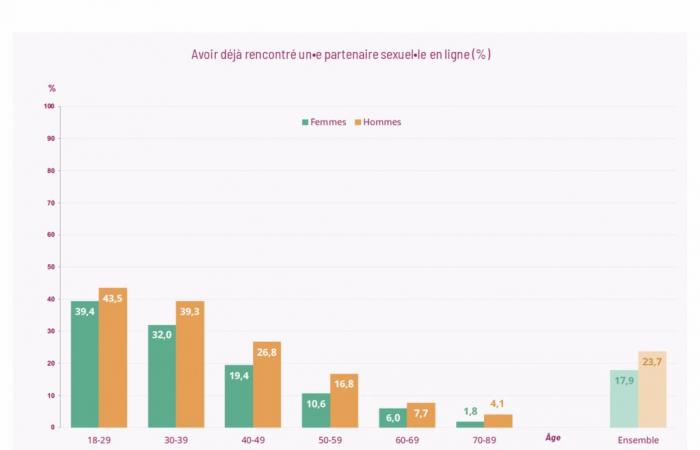A major survey* on French sexual practices, carried out over five years by Inserm, ANRS Infectious Diseases and Public Health Francedelivers his lessons today. LSexual practices are now more varied, intercourse less frequent, first intercourse later, and the number of sexual partners greater. Key points.
Social mapping of sexualities
– Age at first sexual intercourse: an increase in recent years. In 2023, the median age at first intercourse is 18.2 years for women and 17.7 years for men.
– An increase in the number of sexual partners a gap between women and men which remains significant: in 2023, women aged 18-69 declare 7.9 partners on average over their lifetime and men 16.4.
– The spread of sexual practices– In 2023, 72.9% of women and 92.6% of men aged 18-69 report having already practiced masturbation.
Sexual and gender plurality. Social acceptance of homosexuality and transgender identity . In 2023, 69.6% of women and 56.2% of men aged 18-89 consider that homosexuality is a sexuality like any other. 41.9% of women and 31.6% of men aged 18-89 consider that transidentity is an identity like any other.
– Diversity of sexual orientations : in 2023, 8.8% of women and 8.9% of men aged 18-89 report having had at least one partner of the same sex during their life.
– Trans people and people who have thought about changing their gender: in 2023, 1 in a thousand people have taken steps to change their gender and 2.3% of women and 2.4% of men say they have thought about changing their gender.
– Sexualities in digital spaces: a revolution in progress . In 2023, 33% of women and 46.6% of men have had a sexual experience online with another person (connection to a dedicated site, meeting a partner, exchange of intimate images).
– Increasingly reported sexual violence : in 2023, 29.8% of women and 8.7% of men aged 18-69
declare having experienced forced sex or an attempted forced sex during their life.
– Decrease in certain indicators of sexual activity : n 2023, 77.2% of women and 81.6% of men aged 18-69
report having had sexual activity with a partner during the year.
– A sex life that continues into old age : in 2023, 56.6% of women and 73.8% of men remain sexually active between the ages of 50 and 89.
– Slight increase in sexual satisfaction: in 2023, 45.3% of women and 39.0% of men say they are very satisfied with their current sex life.
Sexualities and sexual health
Risks related to sexually transmitted infections
– A decline in prevention at the start of sexual life. In 2023, 75.2% of women and 84.5% of men use a condom the first time they have sex.
– Limited prevention during new sexual relations . In 2023, 49.4% of women and 52.6% of men use a condom during their first sexual intercourse with a partner they met in the last 12 months.
– Insufficient vaccination coverage : in 2023, 63.5% of women and 52.9% of men aged 15-29 are vaccinated against hepatitis B, while 50.6% of women and 20.2% of men of the same age are vaccinated against papillomaviruses.
– Prevalence of STIs in the general population : in 2023, the prevalence of Chlamydia infection is 2.2% among
women aged 18 to 29 and 1.9% among men of the same age.
Risks associated with unwanted pregnancies
– A changing contraceptive landscape : in 2023, 91.0% of women aged 18 to 49 years concerned use a means of contraception, the intrauterine device (IUD or IUD) becomes the most used method (27.7%) followed by the pill (26.8%) and condoms (18.6%).
– Unwanted pregnancies on the rise: in 2023, 34.7% of last pregnancies occurring within 5 years
are unwanted.
Sexual and gender plurality and health
– People who have had sex with people of the same sex and people who have thought about changing their gender are exposed to higher sexuality-related risks, in particular sexual violence, which contribute to the deterioration of their condition mental health.
Demedicalization of sexual health: opportunities and challenges of using digital technology
– In 2023, digital technology represents a source of information for 75% of women and 69.7% of men, but a minority is in favor of access to online sexual health care.
Une enquête pour quoi faire ?
Les transformations de la société française au cours des dernières décennies, tant sur le plan social et juridique, qu'économique et technologique, ont eu une incidence sur les représentations et les pratiques dans le domaine de la sexualité et de la santé sexuelle. Afin de mieux comprendre ces évolutions, l'ANRS Maladie infectieuses émergentes a initié et financé la recherche « Contexte des sexualités en France » 2023 (CSF-2023) menée par des chercheuses de l'Inserm et de l'université Paris 1 Panthéon-Sorbonne, avec une équipe pluridisciplinaire. Il s'agit de la 4ème recherche portant sur ce sujet en France, la dernière datant de 2006. Trois thématiques structurent cette recherche :
1. Etudier la diversification des représentations, des pratiques et des trajectoires sexuelles dans un contexte social
2. Analyser l'effet des conditions de vie sur les trajectoires sexuelles,
3. Analyser les relations positives et/ou négatives entre différentes dimensions de la sexualité et l'état de santé
Enfin, la recherche CSF-2023 est conçue pour fournir des indicateurs clés permettant d'évaluer la stratégie nationale de santé sexuelle à l'horizon 2030.
*Data collection from 31,518 people – The selection of individuals is based on the generation of random telephone numbers (80% cell phones, 20% landlines) followed by the selection of one eligible person (15-89 years old) per number. In total, 21,259 people residing in mainland France and 10,259 people residing in overseas territories voluntarily participated in the research. Among them, 17,135 adults (12,906 in France and 4,229 in Overseas) participated in component 2 (online questionnaire) and 5,735 respondents aged 18 to 59 participated in the PrévIST component (4,872 in France and 863 in Overseas). Data collection started in November 2022 and ended in December 2023. The interviews were carried out by 133 investigators from the Ipsos institute, trained by the research team and the institute's field managers. . In total, the interviews represent 65,000 hours of work for the investigators, accompanied daily by field managers, as well as by members of the research team, in order to ensure the quality of the collection.
• First results of the CSF-2023 survey – mainland France. Inserm – ANRS – MIE, November 13, 2024.









